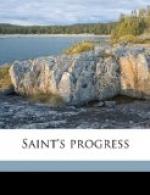I
Such a day made glad the heart. All the flags of July were waving; the sun and the poppies flaming; white butterflies spiring up and twining, and the bees busy on the snapdragons. The lime-trees were coming into flower. Tall white lilies in the garden beds already rivaled the delphiniums; the York and Lancaster roses were full-blown round their golden hearts. There was a gentle breeze, and a swish and stir and hum rose and fell above the head of Edward Pierson, coming back from his lonely ramble over Tintern Abbey. He had arrived at Kestrel, his brother Robert’s home on the bank of the Wye only that morning, having stayed at Bath on the way down; and now he had got his face burnt in that parti-coloured way peculiar to the faces of those who have been too long in London. As he came along the narrow, rather overgrown avenue, the sound of a waltz thrummed out on a piano fell on his ears, and he smiled, for music was the greatest passion he had. His dark grizzled hair was pushed back off his hot brow, which he fanned with his straw hat. Though not broad, that brow was the broadest part of a narrow oval face whose length was increased by a short, dark, pointed beard—a visage such as Vandyk might have painted, grave and gentle, but for its bright grey eyes, cinder-lashed and crow’s-footed, and its strange look of not seeing what was before it. He walked quickly, though he was tired and hot; tall, upright, and thin, in a grey parsonical suit, on whose black kerseymere vest a little gold cross dangled.
Above his brother’s house, whose sloping garden ran down to the railway line and river, a large room had been built out apart. Pierson stood where the avenue forked, enjoying the sound of the waltz, and the cool whipping of the breeze in the sycamores and birches. A man of fifty, with a sense of beauty, born and bred in the country, suffers fearfully from nostalgia during a long unbroken spell of London; so that his afternoon in the old Abbey had been almost holy. He had let his senses sink into the sunlit greenery of the towering woods opposite; he had watched the spiders and the little shining beetles, the flycatchers, and sparrows in the ivy; touched the mosses and the lichens; looked the speedwells in the eye; dreamed of he knew not what. A hawk had been wheeling up there above the woods, and he had been up there with it in the blue. He had taken a real spiritual bath, and washed the dusty fret of London off his soul.
For a year he had been working his parish single-handed—no joke—for his curate had gone for a chaplain; and this was his first real holiday since the war began, two years ago; his first visit, too, to his brother’s home. He looked down at the garden, and up at the trees of the avenue. Bob had found a perfect retreat after his quarter of a century in Ceylon. Dear old Bob! And he smiled at the thought of his elder brother, whose




